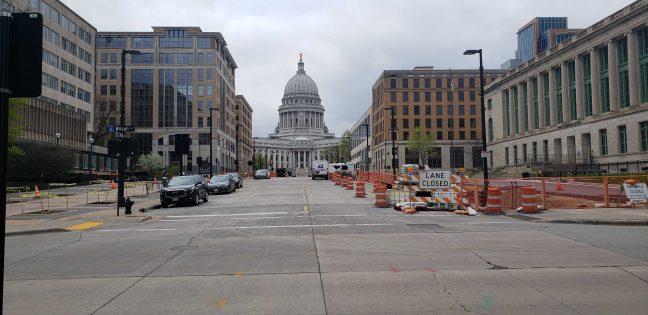COVID-19 has led to increased pressure on local and federal government officials to make extensive budget cuts.
University of Wisconsin Professor Emeritus of Public Affairs and Applied Economics Andrew Reschovsky predicts UW will experience a drop in revenue.
“The largest tax revenue sources of the Wisconsin state government are individual income tax, corporate income tax and sales tax,” Reschovsky said. “Our projection is that those are going to decline.”
Mayor Satya Rhodes-Conway and other Madison city officials are currently working on the 2021 Executive Budget and Capital Improvement Plan.
This plan requires agencies to propose five percent reduction proposals. Rhodes-Conway plans to release the full CIP in October.
UW will have $10 million budget cuts, redistribute money to students
According to Reschovsky, Madison will face a shortfall of 55 to 86 million dollars in fiscal year 2021, leading to extensive cuts to the city’s essential services.
“If there are tens of millions of dollars in cuts and revenues, that inevitably leads to substantial cuts in government spending and government services,” Reschovsky said.
That includes cuts to education, public safety, public health and transportation, Reschovsky said.
As reported by UW’s Center of Research on the Wisconsin Economy, the two categories hardest hit by the pandemic are restaurants and travel. These sectors rely on sales tax, which is most immediately impacted by the economic downturn.
CROWE reports that though the amount of transactions decreased, transaction size increased. According to UW macroeconomics professor Noah Williams, there was a reallocation of consumer spending towards groceries and online shopping.
“Online taxation has helped a lot,” Williams said. “There was not nearly the reduction in sales taxes and corporate taxes that we were anticipating earlier this summer.”
Online shopping made an impact on local businesses. Some businesses increased their online presence, but most online purchases went through national retailers such as Amazon, according to the CROWE report.
Williams said lower wage sectors such as leisure and hospitality experience the highest levels of income inequality because these workers generally have less cushion, shorter work histories and lower wage jobs.
Wisconsin COVID-19 spread reaches ‘uncontrolled’ level experts say
“The big concern is that a lot of temporary layoffs could become more permanent,” Williams said. “Businesses aren’t able to operate at full capacity so they cut back on staffing or maybe just go under.”
UW is experiencing similar effects to these sectors from Gov. Tony Evers’ state agency spending cuts. According to Reschovsky, these cuts are due to the difficulties of reducing health care-related spending during a pandemic.
The state can balance its budget by cutting UW’s budget, Reschovsky said.
“And that might occur right when the university is spending extra money to take special measures to avoid the spread of COVID-19,” Reschovsky said.
According to Forbes, the U.S. Congress is at a standstill in developing the next stimulus package. Forbes reports this is largely due to disagreements between the two political parties.
City of Madison’s Finance Director David Schmiedicke said things like continuing paycheck protection, additional enhanced unemployment benefits, providing budget stabilization, funding to state and local governments and Paycheck Protection are important in the next stimulus bill.
“I think how those businesses fare through these economic conditions is going to be a factor of how Congress and the federal government reacts to another round of economic stimulus,” Schmiedicke said.
Daily number of applications filed for unemployment exceeded 20,000
According to Williams, the Paycheck Protection Program, which helped businesses keep their workforce employed during the pandemic, was one of the most effective programs put in place by Congress.
Williams hoped to see more programs like the PPP and other budget stabilization funds when Congress reconvened on Sept. 8.
“If budget stabilization funds for state and local governments are provided to Wisconsin, that would help dramatically to stave off the depth of the cuts that we are looking at right now,” Williams said. “To some extent, that money could be used to mitigate cuts we are having to make.”
The state may be able to avoid reductions to UW’s budget, state aid to school districts or other items, Williams said.


















